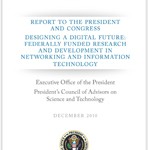 The President’s Council of Advisors on Science and Technology (PCAST) this afternoon released a report — “Designing a Digital Future: Federally Funded Research and Development in Networking and Information Technology” — about the status and direction of the government’s 14-agency, $4.3 billion Networking and Information Technology Research and Development (NITRD) program. The report emphasizes the critical role of advances in networking and information technology (NIT) to the nation’s economic competitiveness — and calls upon the nation to “continue to innovate more rapidly and creatively than other countries in important areas of NIT” in order to sustain and improve overall quality of life.
The President’s Council of Advisors on Science and Technology (PCAST) this afternoon released a report — “Designing a Digital Future: Federally Funded Research and Development in Networking and Information Technology” — about the status and direction of the government’s 14-agency, $4.3 billion Networking and Information Technology Research and Development (NITRD) program. The report emphasizes the critical role of advances in networking and information technology (NIT) to the nation’s economic competitiveness — and calls upon the nation to “continue to innovate more rapidly and creatively than other countries in important areas of NIT” in order to sustain and improve overall quality of life.
Among the key research recommendations, PCAST calls for new multi-agency NIT R&D initiatives that support high-risk/high-reward research in areas of particular importance to national priorities:
Health information technology: make possible comprehensive lifelong multi-source health records for individuals; enable both professionals and the public to obtain and act on health knowledge from diverse and varied sources as part of an interoperable health IT ecosystem; and provide appropriate information, tools, and assistive technologies that empower individuals to take charge of their own health and healthcare to reduce its cost. Importantly, PCAST states that we must “[go] well beyond the current national program to adopt electronic health records.”
Energy and transportation: dynamic power management broadly; interoperable standards for real-time control; low-power systems and devices; and improved surface and air transportation.
Security and robustness of cyber-infrastructure: more effective ways to build trustworthy computing and communications systems; better defense mechanisms for today’s infrastructure; and fundamentally new approaches for making cyber-infrastructure truly resilient to cyber-attack, natural disaster, and inadvertent failure.
“Advances in NIT are crucial to achieving our major national and global priorities in energy and transportation, education and life-long learning, healthcare, and national and homeland security. NIT will be an indispensable element in buildings that manage their own energy usage; attention-gripping, personalized methods that reinforce classroom lessons; continuous unobstrusive assistance for people with physical and mental disabilities; and strong resilience in cyberwarfare.” Ultimately, NIT advances “accelerate the pace of discovery in nearly all other fields.” They “are essential to achieving the goals of open government.”
PCAST also calls for increased investment in a number of fundamental NIT research areas that will accelerate progress across a broad range of priorities, including: privacy and security; human-computer interaction (“human-machine interaction and social collaboration and problem-solving in a networked, online environment”); data analytics, including data collection, storage, management, and automated large-scale analysis based on machine learning and predictive modeling; and computing in the physical world, through advanced sensor and control networks, innovative robotics, etc.
Importantly, PCAST notes that, while industry continues to make major contributions to this field, “It is important … not to equate the very large industry R&D investment in NIT with fundamental research of the kind that is carried out in universities and a small number of industrial research labs. The vast majority of industry R&D in NIT is focused on development… fundamental research with the potential for future transformational application represents a small fraction of overall industry R&D in NIT… [and consequently] Federal investment in NIT R&D is and will remain essential.”
White House Office of Science and Technology Policy Deputy Director for Policy Tom Kalil spoke directly to these recommendations during this afternoon’s roll-out, describing the critical importance of NIT R&D to the current administration. He argued that the information revolution is far from over, with a number of core challenges in computer science yet to be addressed; described how NIT can accelerate the pace of discovery in virtually every scientific domain; pointed to the huge impact NIT is having upon the nation’s economy, with over two-thirds of the increase in productivity since 1995 due to NIT; and highlighted the very direct relationship between NIT and our nation’s grand challenges — healthcare, education, energy, and open government, among others.
In preparing the report, PCAST was assisted by a 14-member working group that consulted with many experts from inside and outside of government, and from inside and outside of the field.
A copy of the full report is available for download from the PCAST website: http://www.whitehouse.gov/sites/default/files/microsites/ostp/pcast-nitrd-report-2010.pdf.
Update 12/19/2010: There’s now a description of the policy aspects of the report at CRA’s Policy Blog. Also, you can view video of Thursday’s roll-out here; look for comments by Tom Kalil beginning at 8:00, and “external discussants” Robert Atkinson (Information Technology and Innovation Foundation) and Tom Leighton (MIT & Akamai Technologies) beginning at 42:30 and 50:40, respectively.
Update 12/21/2010: The New York Times‘ Steve Lohr has posted an entry on his Bits blog about the PCAST report and roll-out: “Smarter, Not Faster, Is the Future of Computing Research.”
(Posted by Erwin Gianchandani, CCC Director)










Trackbacks /
Pingbacks